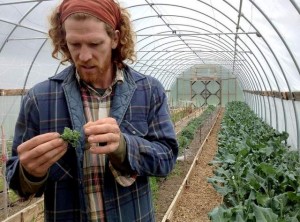I interviewed Josh Carter, the Garden Market and Agricultural director of Shelburne Farms- not because Shelburne Farms is a perfect model of rewilding, in fact, Carter agrees that the property is exactly the opposite of “wild”, but because it is a perfect example of agriculture utilizing the land in a restorative way, while also meeting human needs and stewarding the natural environment.
Interview Transcript
Q: What are your goals for the Shelburne Farms agricultural system?
A: Natural resources are imperative for the health and prosperity of a productive agricultural system, so regenerating those which we deplete is the basic fundamental goal in our production. That being said, the agriculture at Shelburne Farms is not, by definition of agriculture, a permaculture system at all, meaning we grow mostly annual crops and harvest them in large quantities. We do, however understand that resources such as insects, pollinators, water, and soil are important and so we do try to create habitat for them in unused agricultural lands.
Q: What specific ways do you use agricultural lands when not used for production purposes?
A: We make sure to use cover crops on all of our barren fields- primarily pollinator attracting nitrogen fixing species such as clover, barley, and native grasses. Shelburne Farms faced the problem of depleted soils for years because of the fact that it was once 30 smaller parceled farms which were used in a very traditional way- dairy farming, cattle grazing, and large crop production. We have had to rebuild ecosystems integrated into our semi-traditional agricultural systems in order to include the benefits of wildlife, pollinators, and natural micro climates.
Q: How do you manage these small ecosystems?
A: Unintentionally, we manage most of the forested areas as little as possible to ensure natural community health. Intentionally, we plant specifically for pollinator habitat in many fields, and let weeds and flowering plants grow where they may. We also make sure to have strips of forested areas- wildlife corridors- in between our agricultural fields to make for a more natural feel for the wildlife, to encourage abundance.
Q: On a different track, how does tourism affect land use and the “wildness” of Shelburne Farms?
A: Tourism at Shelburne Farms definitely enhances the land use, because of the influx of money in season, we are able to pay more people to steward the land, and put more resources into proper care. In another way, tourism also builds a land ethic that teaches people to be stewards of the land- both natural environments, and “enhanced” land, nd the ability of those two to exist together. In this interview, I realized the importance of what was going on at Shelburne Farms. The ability to balance such a large portion of “wild” and lightly maintained forest with rigorous agricultural and dairy farm land is the way that rewilding should go. The term rewilding does not necessarily mean that humans must have a completely hands-off approach, but the integration of all needs and systems of production into natural areas can create a unique and healthy ecosystem, as it has at Shelburne Farms.

